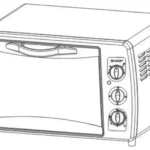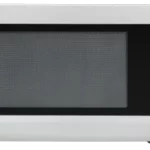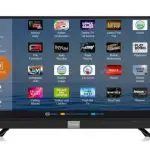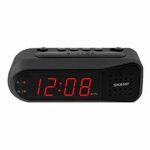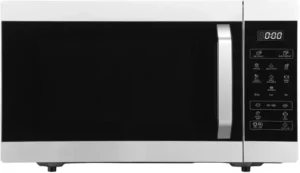

R224HW
Microwave Oven
OPERATION MANUAL WITH COOKING GUIDE
Read all instructions carefully before using the oven.
WARRANTY
Consumer Electronic Products
Congratulations on Your Purchase!
This Sharp product is warranted against faults in material and manufacture for the period as stated in the table below.
If service is required during the warranty period, please contact your nearest Sharp Approved Service Centre. These repairs would be carried out at no charge to the owner, subject to the conditions specified herein.
This warranty does not extend to defects or injuries caused by or resulting from causes not attributable to faulty parts or the manufacture of the product, including but not limited to, defect or injury caused by or resulting from misuse, abuse, neglect, lack of maintenance, accidental damage, improper voltage, liquid spillage, vermin infestation, software, or any alterations made to the product which are not authorized by Sharp.
Please retain your sales documentation, as this should be produced to validate a warranty claim. This warranty is in addition to and in no way limits, varies, or excludes any implied rights and remedies under any relevant legislation in the country of sale.
This warranty does not cover transportation to and from the Sharp Approved Service Centre. Goods presented for repair may be replaced by refurbished goods of the same type rather than being repaired. Refurbished parts may be used to repair the goods. The repair of your goods may result in the loss of user-generated data, please ensure that you have saved this data elsewhere prior to repair.
Australian customers: Our goods come with guarantees that cannot be excluded under the Australian Consumer Law. You are entitled to a replacement or refund for a major failure and for compensation for any other reasonably foreseeable loss or damage. You are also entitled to have the goods repaired or replaced if the goods fail to be of acceptable quality and the failure does not amount to a major failure. The criteria of a major failure is defined in the Australian Consumer Law. Should you require any assistance with a major failure please contact Sharp Customer Care.
WARRANTY PERIODS
| Home Theatre Projector | 12 months |
| Audio/Home Theatre | 12 months |
| Microwave Oven | 12 months |
| Steam Oven | 12 months |
| Refrigerator | 24 months |
| DVD/Blu-ray | 12 months |
| Air Conditioner | 60 months |
| Portable Air Conditioner | 12 months |
| LCD Television | 36 months |
| Air Purifier | 12 months |
(excluding lamps and air filters)
IMPORTANT NOTICE: This warranty applies only to products sold in Australia & New Zealand
| FOR LOCATION ENQUIRIES WITHIN AUSTRALIA REGARDING YOUR LOCAL SHARP APPROVED SERVICE CENTRE VISIT OUR WEBSITE AT www.sharp.net.au OR CALL SHARP CUSTOMER CARE 1300 135 022 (LOCAL CALL COST APPLY WITHIN AUSTRALIA) SHARP CORPORATION OF AUSTRALIA PTY LTD |
FOR LOCATION ENQUIRIES WITHIN NEW ZEALAND REGARDING YOUR LOCAL SHARP APPROVED SERVICE CENTRE VISIT OUR WEBSITE AT www.sharp.net.nz CONTACT YOUR SELLING DEALER/RETAILER OR CALL SHARP CUSTOMER SERVICES TELEPHONE: 09 573 0111 FACSIMILE: 09 573 0113 SHARP CORPORATION OF NEW ZEALAND LIMITED |
| Model name: | EM923A2CQ-P00E00 |
| AC Line Voltage Distribution line fuse/circuit breaker AC Power required: Microwave Output power: Microwave Energy Save Mode |
: 230 V, 50 Hz single phase : 10 A : 1450 W : 900 W : < 1,0W : < 0,5W |
| Microwave Frequency Outside Dimensions (W) x (H) x (D) mm Cavity Dimensions (W) x (H) x (D)** mm Oven Capacity Turntable Weight Oven lamp |
: 2450 MHz* : 485 x 405 x 293 : 314 X 347 X 221 : 23 litres** : ø 270 mm t: approx.13.54 kg : 25 W |
* This Product fulfils the requirement of the European standard EN55011.
In conformity with this standard, this product is classified as group 2 class B equipment.
Group 2 means that the equipment intentionally generates radio-frequency energy in the form of electromagnetic radiation for the heat treatment of food.
Class B equipment means that the equipment is suitable to be used in domestic establishments.
** Internal capacity is calculated by measuring maximum width, depth and height. The actual capacity for holding food is less.
AS PART OF A POLICY OF CONTINUOUS IMPROVEMENT, WE RESERVE THE RIGHT TO ALTER DESIGN AND SPECIFICATIONS WITHOUT NOTICE.
IMPORTANT SAFETY INSTRUCTIONS
IMPORTANT SAFETY INSTRUCTIONS: READ CAREFULLY AND KEEP FOR FUTURE REFERENCE.
- This oven is designed to be used on a benchtop, on a shelf or built-in with a Sharp built-in kit (not available in all countries). We do not recommend installing the oven under the benchtop or any other appliances. The appliance must not be placed in a cupboard. See page 5 for the installation.
Place or mount the oven so that the bottom of the oven is 85 cm or more above the floor. - Ensure there is a minimum of free space above the oven of 15 cm. See page 5 for the other necessary spaces.
- This appliance is intended to be used in households and similar applications such as:
- staff kitchen areas in shops, offices and other working environments;
- farmhouses;
- by clients in hotels, motels and other residential environments;
- bed and breakfast type environments
It is not suitable for commercial or laboratory use.
- The microwave oven is intended for heating food and beverages. Drying of food or clothing and heating of warming pads, therapeutic devices (eg. wheat bags), slippers, sponges, damp cloth and similar may lead to the risk of injury, ignition or fire.
- This appliance is not intended for use by persons (including children) with reduced physical, sensory or mental capabilities, or lack of experience and knowledge unless they have been given supervision or instruction concerning the use of the appliance by a person responsible for their safety.
- Children should be supervised to ensure that they do not play with the appliance.
- WARNING: Only allow children to use the oven without supervision when adequate instructions have been given so that the child is able to use the oven in a safe way and understands the hazards of improper use.
- WARNING: If the door or door seals are damaged, the oven must not be operated until it has been repaired by an authorized SHARP service agent or microwave technician.
- WARNING: Never adjust, repair or modify the oven yourself. It is hazardous for anyone other than an
authorized SHARP service agent or microwave technician to carry out any service or repair operation
which involves the removal of a cover that gives protection against exposure to microwave energy. - If the power supply cord of this appliance is damaged, it must be replaced by a service centre approved by SHARP in order to avoid a hazard.
- WARNING: Liquids and other foods must not be heated in sealed containers since they are liable to explode.
- Microwave heating of beverages can result in delayed eruptive boiling, therefore care must be taken when handling the container.
- Eggs in their shell and whole hard-boiled eggs should not be heated on microwave modes since they may explode, even after microwave heating has ended. To cook or reheat eggs that have not been scrambled or mixed, pierce the yolks and the whites, or the eggs may explode. Shell and slice hard-boiled eggs before reheating them in the microwave oven.
- Utensils should be checked to ensure that they are suitable for use in the oven. See Page 2. Use only microwave-safe containers and utensils on microwave modes.
- Metallic containers for food and beverages are not allowed during microwave modes.
- The contents of feeding bottles and baby food jars must be stirred or shaken and the temperature checked before consumption, in order to avoid burns.
- When heating food in plastic or paper containers, keep an eye on the oven due to the possibility of ignition.
- If smoke is observed, switch off or unplug the appliance and keep the door closed in order to stifle any flames.
- The oven should be cleaned regularly and any food deposits removed.
- Cleaning and user maintenance shall not be performed by children without supervision.
- Failure to maintain the oven in a clean condition could lead to deterioration of the surface that could adversely affect the life of the appliance and possibly result in a hazardous situation.
- The appliance must not be cleaned with a steam cleaner.
- See instructions for cleaning door seals, cavities and adjacent parts on page 19.
- Handle with care when removing items from the oven so that the turntable does not displace.
Other warnings
- To reduce the risk of fire in the oven cavity:
a. Do not overcook food.
b. Remove wire twist-ties from paper or plastic bags before placing the bag in the oven.
c. Do not heat oil or fat for deep frying. The temperature of the oil cannot be controlled. - To reduce the risk of an explosion or delayed eruptive boiling, care should be taken when handling the container. Your oven is capable of heating food and beverages very quickly with microwaves, therefore it is very important that you select the appropriate cooking time and power level for the type and quantity of food to be heated. If you are unsure of the cooking time and power level required, begin with low cooking times and power levels until the food is sufficiently heated evenly throughout.
Additionally:
a. Do not place sealed containers in the oven. Baby bottles fitted with a screw cap or teat are considered to be sealed containers.
b. Do not use excessive amounts of time.
c. When boiling liquids in the oven, use a wide-mouthed container.
d. Stand at least for 20 seconds at the end of cooking to avoid delayed eruptive boiling of liquids.
e. Stir the liquid before and during cooking. Use extreme care when handling the container or inserting
a spoon or other utensil into the container. - Never operate the oven whilst any object is caught or jammed between the door and the oven.
- Handle with care when removing items from the oven so that the utensil, your clothes or accessories do not touch the latches.
- Never poke an object, particularly a metal object, through a grille or between the door and the oven while the oven is operating.
- Never tamper with or deactivate the door safety latches.
- Always use oven gloves to prevent burns when handling utensils that are in contact with hot food. Enough heat from the food can transfer through utensils to cause skin burns.
- If the oven lamp fails please consult your dealer or a qualified service technician trained by SHARP.
- Avoid steam burns by directing steam away from the face and hands. Slowly lift the furthest edge of a dish’s cover including microwave plastic wrap etc., and carefully open popcorn and oven cooking bags away from the face.
- Make sure that the power supply cord is undamaged, and that it does not run under the oven or over any hot surfaces or sharp edges.
- To prevent the turntable from breaking:
a. Before cleaning the turntable with water, leave the turntable to cool.
b. Do not place anything hot on a cold turntable.
c. Do not place anything cold on a hot turntable. - Do not place anything on the outer cabinet.
- Do not store food or any other items inside the oven.
- Make sure the utensil does not touch the interior walls during cooking.
- Ensure the handles of utensils do not touch walls when turntables rotate. Take care as handles may become extremely hot if the utensil stops rotating.
Information on Disposal
This product should not be disposed of in a general waste bin as it contains materials that should be recycled, which is good for the environment.
If you are in doubt about the correct disposal method, contact your local council.
SPECIAL NOTES AND WARNINGS
| DO | DON’T | |
| Eggs, fruits, nuts, seeds, vegetables, sausages and oysters | * Puncture egg yolks and whites and oysters before cooking to prevent “explosion”. * Pierce skins of potatoes, apples, squash, hot dogs, sausages and oysters so that steam escapes. | * Cook eggs in shells. This can cause the egg to “explode”, which may damage the oven or cause injury to yourself. * Cook hard/soft boiled eggs. * Overcook oysters. * Dry nuts or seeds in shells. |
| Popcorn | * Use specially bagged popcorn for the microwave oven. * Listen while popping corn for the popping to slow to 1-2 seconds. |
* Pop popcorn in regular brown bags or microwave-safe glass bowls. * Exceed maximum time on popcorn package. |
| Baby food | * Transfer baby food to a small dish and heat carefully, stirring often. Check for suitable temperatures to prevent burns. * Remove the screw cap and teat before warming baby bottles. After warming shake thoroughly. Check for suitable temperature. |
* Heat disposable bottles. * Overheat baby bottles. Only heat until warm. * Heat bottles with teats on. * Heat baby food in original jars. |
| General | * Food with filling should be cut after heating, to release steam and avoid burns. * Use a deep microwave-safe glass bowl when cooking liquids or cereals to prevent boiling over. |
* Heat or cook in closed glass jars or airtight containers. * Deep fry fat. * Heat or dry wood, herbs, wet papers, clothes or flowers. * Operate the oven without a load (i.e. an absorbing material such as food or water) in the oven cavity. |
| Liquids (Beverages) | * For boiling or cooking liquids see IMPORTANT SAFETY INSTRUCTIONS on page 2 to prevent explosion and delayed eruptive boiling. | * Heat for longer than the recommended time. See REHEATING-FOOD CHART on-page. |
| Canned foods | * Remove food from a can. | * Heat or cook food while in cans. |
| Sausage rolls, pudding pies, Christmas | * Cook for the recommended time. (These foods have high sugar and/or fat contents.) |
* Overcook as they may catch fire. |
| Meats | * Use a microwave-proof roasting rack to collect drained juices. | *Place meat directly on the turntable for cooking. |
| Utensils | * Check the utensils are suitable for MICROWAVE cooking before you use them. | * Use metal utensils for MICROWAVE cooking. Metal reflects microwave energy and may cause an electrical discharge known as arcing. |
| Aluminium foil | * Use to shield food to prevent overcooking. * Watch for sparking. Reduce foil or keep clear of cavity walls. |
* Use too much. * Shield food close to cavity walls. Sparking can damage the cavity. |
| Browning dish | * Place a suitable insulator such as a microwave and heatproof dinner plate between the turntable and the browning dish. | * Exceed the preheating time recommended by the manufacturer. Excessive preheating can cause the glass turntable to shatter and/or damage the internal parts of the oven. |
INSTALLATION INSTRUCTIONS
- Remove all packing materials from the oven cavity, (do not remove the waveguide cover), and the feature sticker from the outside of the door, if there is one. Check the unit for any damage, such as a misaligned door, damaged door seals around the door, or dents inside the oven cavity or on the door. If there is any damage, please do not operate the oven until it has been checked by a SERVICE CENTRE APPROVED BY SHARP and repaired, if necessary.
- Accessories provided
1) Turntable 2) Roller stay 3) Operation manual and Cookbook - Place the roller stay in the coupling on the oven floor, then place the turntable onto the roller stay, ensuring it is located firmly. Refer to OVEN DIAGRAM below. NEVER operate the oven without the roller stay and turntable.
- This oven is designed to be used on a benchtop, on a shelf, or built-in (not available in all countries). The appliance must not be placed in a cupboard. It should not be installed in any area where heat and steam are generated, for example, next to a conventional oven unit. The oven should be installed so as not to block ventilation openings. When the oven is mounted on a kitchen benchtop, allow a space of at least 15cm on the top, 10cm on both sides, and 5cm at the rear of the oven for adequate air circulation. When installing on a shelf, the minimum dimension of the shelf should be 720mm(W) x 465mm(H) x 460mm(D).
Do not build in the appliance under the benchtop or any other appliances.
If the oven is to be positioned near a conventional oven, ensure that adequate space is allowed, and a suitable heat shield is incorporated between the two to prevent damage to the oven.
WARNING: The electrical outlet must be readily accessible so that the unit can be unplugged easily in an emergency. - Neither the manufacturer nor the distributors can accept any liability for damage to the machine or
personal injury for failure to observe the correct electrical connecting procedure.
The A.C. voltage must be single phase 230 – 240V, 50Hz. - This appliance must be earthed.
- Operate the oven from a general-purpose domestic outlet.
If a generator is used, do not operate the oven with non-sinusoidal outputs.
OVEN DIAGRAM
| 1. Door open button 2. Oven lamp 3. Door hinges 4. Door safety latches 5. See-through door 6. Door seals and sealing surfaces 7. Coupling 8. Waveguide cover (Do not remove) |
9. Control panel (See page 6) 10. LED Display 11. Ventilation openings 12. Power supply cord 13. Turntable 14. Roller stay 15. Oven Cavity 16. Outer cabinet |
OVEN AND ACCESSORIES
OVEN
| 1. Door 2. Door hinges 3. Oven lamp 4. Waveguide cover (DO NOT REMOVE) 5. Control panel 6. Coupling 7. Door latches |
8. Oven cavity 9. Door seals and sealing surfaces 10. Door safety latches 11. Ventilation openings 12. Outer cabinet 13. Power supply cord 14. Door opening button |
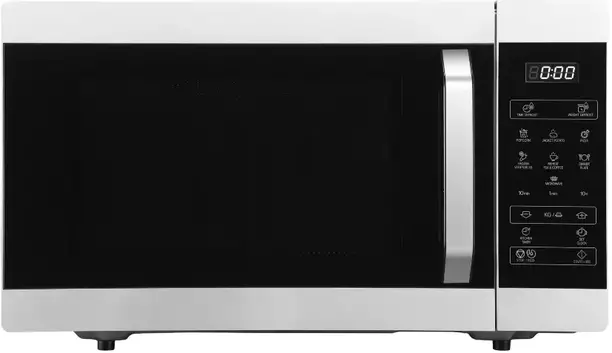
ACCESSORIES:
Check to make sure the following accessories are provided:
(15) Turntable (16) Turntable support (17) Coupling Place the turntable support in the center of the oven floor so that it can freely rotate around the coupling. Then place the turntable onto the turntable support so that it locates firmly into the coupling. To avoid turntable damage, ensure dishes and containers are lifted clear of the turntable rim hen remove them from the oven.
NOTE:
When you order accessories, please mention
two items: part name and model name
NOTES:
- The waveguide cover is fragile. Care should be taken when cleaning inside the oven to ensure that it is not damaged.
- Always operate the oven with the turntable and turntable support fitted correctly. This promotes thorough, even cooking. A badly fitted turntable may rattle, may not rotate properly and could cause damage to the oven.
- All food and containers of food are always placed on the turntable for cooking.
- The turntable rotates clockwise or anti-clockwise. The rotary direction may change each time you start the oven. This does not affect cooking performance.
CONTROL PANEL
- DIGITAL DISPLAY
- Weight Defrost key
- TIME DEFROST key
- AUTO MENU keys
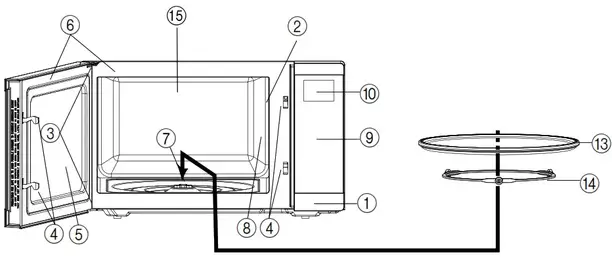
5. TIME keys
6. MICROWAVE POWER LEVEL key: Press to select the microwave power level.
7. WEIGHT/PORTION keys (up and down)
8. KITCHEN TIMER key Press to use as a minute timer, or to program standing time.
9. CLOCK SET key
10. START/ ![]() +30s
+30s
11. STOP key
SETTING THE CLOCK
Your oven has a 24-hour clock mode.
1. Press the CLOCK SET key ![]() once and “00:00” will flash.
once and “00:00” will flash.
2. Press the time keys and enter the current time. Enter the hours by pressing the 10 min key and enter the minutes by pressing the 1 and 10 keys.
3. Press the CLOCK SET key ![]() to finish the clock setting.
to finish the clock setting.
- NOTES:
- If the clock is set, when cooking is complete, the display will show the correct time of day. If the clock has not been set, the display will only show”0:00″ when cooking is complete.
- To check the time of day during a cooking process, press the CLOCK SET key, and the LED will display the time of day for 2-3 seconds. This does not affect the cooking process
- While in the clock setting mode, if the STOP key is pressed or if there is no operation within 1 minute, the oven will go back to the former setting.
- If the electrical power supply to your microwave oven is interrupted, the display will intermittently show “0:00” after the power is reinstated. If this occurs during cooking, the program will be erased. The time of day will also be erased.
| Power Level | Press the MICROWAVE POWER LEVEL key |
Display (Percentage) |
| HIGH | x1 | 100P |
| x2 | 90P | |
| MEDIUM-HIGH | x3 | 80P |
| x4 | 70P | |
| MEDIUM | x 5
60P |
|
| x6 | 50P | |
| MEDIUM LOW (DEFROST) | x7 | 40P |
| x8 | 30P | |
| LOW | x9 | 20P |
| x10 | 10P | |
| x11 | OP |
Generally, the following recommendations apply:
100P/ 90P – (HIGH) used for fast cooking or reheating e.g. for casseroles, hot beverages, vegetables, etc.
80P/ 70P – (MEDIUM HIGH) used for longer cooking of dense foods such as roast joints, meatloaf, and plated meals, also for sensitive dishes such as sponge cakes. At this reduced setting, the food will cook evenly without overcooking at the sides.
60P/ 50P – (MEDIUM) for dense foods which require a long cooking time when cooked conventionally, e.g. GB-18
- Your oven has 11 power levels, as shown.
- To change the power level for cooking, press the MICROWAVE POWER LEVEL key until the display indicates the desired level. Set up the desired cooking time by pressing the TIME keys. Press the START key to start the oven.
- To check the power level during cooking, press the MICROWAVE POWER LEVEL key. As long as your finger is pressing the MICRO-WAVE POWER LEVEL key the power level will be displayed. The oven continues to count down although the display will show the power level.
- If is selected, the oven will work with a fan for no power. You can use this level to remove any odors. beef casserole, it is advisable to use this power setting to ensure the meat will be tender. 40P/ 30P – (MEDIUM LOW) to defrost, select this power setting, to ensure that the dish defrosts evenly. This setting is also ideal for simmering rice, pasta, dumplings, and cooking egg custard. 20P/ 10P – (LOW) For gentle defrosting, e.g. pastry.
MANUAL OPERATION
Opening the door: To open the oven door, press the door opening button. Starting the oven: Prepare and place food in a suitable container onto the turntable or place directly onto the turntable. Close the door and press the STARTK>+30s key after selecting the desired cooking mode. Once the cooking program has been set and the START/40+30s key is not pressed in 1 minute, the setting will be canceled. The START/0+30s key must be pressed to continue cooking if the door is opened during cooking. The audible signal will sound once when the button is pressed in the correct manner. Use the STOP key to START/+30s![]()
1. Erase a mistake during programming.
2. Stop the oven temporarily during cooking.
3. Cancel a program during cooking, press the STOP key twice.
4. To set and cancel the child lock (refer to page EN-21).![]()
MICROWAVE COOKING
Your oven can be programmed for up 99 minutes 50 seconds (99.50).
MANUAL COOKING/ MANUAL DEFROSTING
- Enter the cooking time and use microwave power levels 100P to 10P to cook or defrost (refer to page 18).
- Stir or turn the food, where possible, 2 – 3 times during cooking.
- After cooking, cover the food and leave to stand, where recommended.
- After defrosting, cover the food in foil and leave to stand until thoroughly defrosted.
Example:
To cook 2 minutes and 30 seconds on 70% microwave power.
| 1. Input the power level by pressing the MICROWAVE POWER LEVEL key 4 times for 70 P. | 2. Enter the cooking time by pressing the 1 key twice and then the 10 key 3 times. | 3. Press the START/ key to start the timer. (The display will count down through the set cooking/defrosting time.) |
|
|
|
|
NOTE:
- When the oven starts, the oven lamp will light and the turntable will rotate clockwise or anticlockwise.
- If the door is opened during cooking/defrosting to stir or turn over food, the cooking time on the display stops automatically. The cooking/ defrosting time starts to count down again when the door is closed and the START key is pressed.
- When cooking/defrosting is complete, open the door or press the STOP key and the time of day will reappear on the display if the clock has been set.
- If you wish to know the power level during cooking, press the MICROWAVE POWER LEVEL key. As long as your finger is the MICROWAVE POWER LEVEL key, the power level will be displayed.
IMPORTANT: - Close the door after cooking/defrosting. Please note that the light will remain on when the door is open, this is for safety reasons to remind you to close the door.
- If you cook food for more than the standard time (see chart below) using the same cooking mode, the oven’s safety mechanisms automatically activate. The microwave power level will be reduced
| Cooking Mode | Standard time |
| Microwave 100 P | 30 minutes |
OTHER CONVENIENT FUNCTIONS
1. SEQUENCE COOKING
This function allows you to cook using up to 2 diff e rent stages which can Include manual cooking time and mode and /or time defrost as well as weight defrost function. Once programmed there is no need to interfere with the cooking operation as the oven will automatically move onto the next stage. The audible signal will sound once after the first stage.
Note: Auto menu cannot be set as one of the multiple sequences.
Example: If you want to defrost the food for 5 minutes, then cook with 80P microwave power for 7 minutes. The steps are as follows:
- Press the TIME DEFROST key once, in the LED display will appear dEF2.
- Enter the cooking time by pressing the 1 key 5 times.
- Input the power level (80P) by pressing the MICROWAVE POWER LEVEL key 3 times.
- Enter the cooking time by pressing the 1 key 7 times.
- Press the theSTART/
 +30s key once to start cooking.
+30s key once to start cooking.
2. +30s FUNCTION (auto-start)
The START/ + key allows you to operate the two following functions:
+ key allows you to operate the two following functions:
a. Direct start
You can directly start cooking on 100 P microwave power level for by pressing the + key.
![]() start/+30s
start/+30s
b. Extend the cooking time You can extend the cooking time during manual cooking, time defrost and auto menu operation for multiples of 30 seconds if the START/ ![]() +30s key is pressed while the oven is in operation. During the weight defrost, the cooking time cannot be increased by pressing the START/
+30s key is pressed while the oven is in operation. During the weight defrost, the cooking time cannot be increased by pressing the START/ ![]() +30s key.
+30s key.
NOTE: The cooking time may be extended to a maximum of 99 minutes 50 seconds.
3. KITCHEN TIMER FUNCTION: You can use the kitchen timer for timing where microwave cooking is not involved for example to time boiled eggs cooked on a conventional hob or to monitor the standing time for cooked/defrosted food.
Example: To set the timer for 5 minutes.
| 1. Press the KITCHEN TIMER key once. |
Enter the desired time by pressing the 1 key 5 times. | Press the START/ |
Check the display. (The display will count down through the set cooking/ defrosting time.) |
When the timer time arrives, the audible signal will sound 5 times and the LED will display the time of day. You can enter any time up to 99 minutes 50 seconds. To cancel the KITCHEN TIMER whilst counting down, simply press the STOP key.
NOTE: The KITCHEN TIMER function cannot be used whilst cooking.
4. CHILD LOCK:
Use to prevent unsupervised operation of the oven by little children.
a. To set the CHILD LOCK:
Press and hold the STOP key for 3 seconds until a long beep sounds. The display will show:
b. To cancel the CHILD LOCK: Press and hold the STOP key for 3 seconds until a long beep sounds.
5. ECO MODE:
In standby mode, press the “ECO” button once, the LED display will be off and the microwave oven enters ECO mode, any operation can light the LED display again, and the microwave oven will return to standby mode.![]()
TIME DEFROST AND WEIGHT DEFROST OPERATION
1. TIME DEFROST
This function quickly defrosts food while enabling you to choose a suitable defrost period, depending on the food type. Follow the example below for details on how to operate this function. The time range is 0:10 – 99:50.
Example: To defrost the food for 10 minutes.
| 1. Select the menu required by pressing the TIME DEFROST key once.x1, the display will show: |
2. Enter the cooking time by pressing the10 key once. |
Press the START/ defrosting. |
Notes for Time Defrost:
• After cooking the audible signal will sound five times and the LED will display the time of day if the clock has been set. If the clock has not been set, the display will only show “0:00” when cooking is complete.
• The preset microwave power level is 30P and can not be changed.
2. WEIGHT DEFROST
The microwave oven is pre-programmed with a time and power level so that the following food is defrosted easily: Pork, beef, and chicken. The weight range for this food is from 0.1kg – 2kg in 0.1kg steps. Follow the example below for details on how to operate these functions.
Example: To defrost a Meat joint weighing 1.2kg using WEIGHT DEFROST. Place the meat in an f dish or microwave oven defrost rack on the turntable.
| 1. Select the menu required by pressing the WEIGHT DEFROST key once. | 2. Enter the weight by pressing the WEIGHT/PORTION keys until the desired weight is displayed. | Press the START/ |
| (The display will count down through defrosting time) |
Frozen foods are defrosted from -18°C.
NOTES FOR WEIGHT DEFROST:
- Before freezing foods, ensure food is fresh and of good quality.
- Food weight should be rounded up to the nearest 0.1kg, for example, 0.65kg to 0.7kg.
- If necessary, shield small areas of meat or poultry with flat pieces of aluminum foil. This will prevent the areas from becoming warm during defrosting. Ensure the foil does not touch the oven walls.
AUTO MENU OPERATION
The AUTO MENU keys automatically work out the correct cooking mode and cooking of the foods (details on
pages GB-4 and GB-22). Follow the example below for details on how to operate this function.
Example: To cook two jacket potatoes (0.46kg) by using the AUTO MENU function.
1. Select the required menu by pressing the Jacket Potato key once.
2. Press WEIGHT/PORTION UP/DOWN keys or continue to press the Jacket Potato key to choose the required number of potatoes (up to 3).
3. Press the START/ + key to start cooking. (The display will count down through cooking time)
NOTES:
• The weight or quantity of the food can be input by pressing the WEIGHT/PORTION UP/DOWN keys until the desired weight/quantity is displayed. Enter the weight of the food only. Do not include the weight of the container.
• For food weighing more or less than the weights/quantities given in the AUTO MENU chart on page GB- 2 cooks by manual operation.
AUTO MENU CHART
| Auto Menu | WEIGHT/ PORTION / UTENSILS | Procedure |
| Popcorn | 0.05kg, 0.1kg | Place the popcorn bag directly on the turntable (Please see the note below: ‘Important Information About Microwave Popcorn Feature’) |
| Jacket Potato | 1, 2, 3 potatoes (pieces) 1 potato = approx. 0.23kg (initial temp. 20° C) | Please use potatoes with similar size of approx. 230g. Pierce each potato in several places and place it towards the edge of the turntable. Turn over and rearrange halfway through cooking. Stand for 3 – 5 minutes before serving. |
| Pizza | 0.1kg, 0.2kg, 0.4kg (initial temp 5°C) Plate | Place the Pizza on a plate in the center of the turntable. Do not cover. |
| Frozen vegetables e.g. Brussel sprouts, green beans, peas, mixed vegetables, broccoli | 0.15kg, 0.35kg, 0.5kg (initial temp -18°C) Bowl and lid | Place vegetables in a suitable container. Add 1 tbsp of water per 100g of vegetables, cover the dish, and place on the turntable. Stir halfway through cooking and after cooking. |
| Reheat Tea & Coffee (120m1/ cup) | 1, 2, 3 (initial temp. 5° C) Cup | Place the cup(s) on the turntable and stir after heating. |
| Dinner Plate | 0.25kg, 0.35kg, 0.5kg (initial temp. 5° C) Plate | Place the plate in the center of the turntable. Do not cover. Stir after cooking. |
Notes:
• The final temperature will vary according to the initial food temperature. Check food is piping hot after cooking. If necessary, you can extend the cooking manually.
• The results when using auto cook depend on variances such as the shape and size of the food and your personal preference as regards cooking results. If you are not satisfied with the programmed result, please adjust the cooking time to match your requirement.
Important Information about Microwave Popcorn Feature:
| 1. When selecting 0.1kg grams of popcorn, it is suggested that you fold down a triangle on each corner of the bag before cooking. Refer to the picture on right. |

|
| 2. If/When the popcorn bag expands and no longer rotates properly, please press the STOP key once and open the oven door and adjust the bag position to ensure even cooking- ing. |

|
SUITABLE OVENWARE
To cook/defrost food in a microwave oven, the microwave energy must be able to pass through the container to penetrate the food. Therefore it is important to choose suitable cookware. Round/oval dishes are preferable to square/oblong ones, as the food in the corners tends to overcook. A variety of cookware can be used as listed below.
| Cookware | Microwave Safe | Comments |
| Aluminum foil Foil Containers | √/x | Small pieces of aluminum foil can be used to shield food from overheating. Keep foil at least 2cm from the oven walls, as arcing may occur.
Foil containers are not recommended unless specified by the manufacturer, e.g. Microfoil ®, follow instructions carefully. |
| Browning dishes | ܃√ | Always follow the manufacturer’s instructions.
Do not exceed the heating times given. Be very careful as these dishes become very hot. |
| China and ceramics | √ | Porcelain, pottery, glazed earthenware,√ and bone china are usually suitable, except for those with metallic decorations. |
| Glassware e.g. Pyrex ® | ܃√/x | Care should be taken if using fine glassware as it can break or crack if heated suddenly. |
| Metal | ܇√ | It is not recommended to use metal cookware as it will arc, which can lead to a fire. |
| Plastic/Polystyrene e.g fast food containers | ܃x | Care must be taken as some containers warp, melt or discolor at high temperatures. |
| Cling film | √ | It should not touch the food and must be pierced to let the steam escape. |
| Freezer/Roasting bags | √ | Must be pierced to let steam escape. Ensure bags are suitable for microwave use. |
| Paper – Plates, cups and kitchen paper | ܃√ | Do not use plastic or metal ties, as they may melt or catch fire due to the metal ‘arcing’. |
| Straw and wooden Containers | √ | Only use for warming or to absorb moisture.
Care must be taken as overheating may cause fire. |
| Recycled paper and newspaper | ܇x | Always attend the oven when using these materials as overheating may cause fire.
May contain extracts of metal which will cause ‘arcing’ and may lead to fire. |
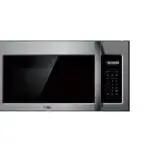 WARNING:
WARNING:
When heating food in plastic or paper containers, monitor the oven due to the possibility of ignition.
CARE AND CLEANING
CLEAN THE OVEN AT REGULAR INTERVALS – Keep the oven clean and remove any food deposits, or it could lead to deterioration of the surface. This could adversely affect the life of the appliance and possibly result in a hazardous situation.
Exterior:
The outside may be cleaned with mild soap and warm water, wipe clean with a damp cloth. Avoid the use of harsh abrasive cleaners. Keep the ventilation openings free of dust.
Door:
Wipe the door and window on both sides, the door seals and adjacent parts frequently with a damp cloth to remove any spills or spatters. Do not use abrasive cleaners.
Touch Control Panel:
Wipe the panel with a slightly dampened cloth with water only.
Do not scrub or use any sort of chemical cleaners. Avoid the use of excess water.
Interior walls:
To clean the interior surfaces, wipe with a soft cloth and warm water. After use wipe the waveguide cover in the oven with a soft damp cloth to remove any food splashes. Built-up splashes may overheat and begin to smoke or catch fire. Do not remove the waveguide cover. DO NOT USE A COMMERCIAL OVEN CLEANER, ABRASIVE OR HARSH CLEANERS AND SCOURING PADS ON ANY PART OF YOUR MICROWAVE OVEN. NEVER SPRAY OVEN CLEANERS DIRECTLY ONTO ANY PART OF YOUR OVEN. Avoid using excess water. After cleaning the oven, ensure any water is removed with a soft cloth.
Turntable/Roller Stay:
Wash with mild soapy water and dry thoroughly.
SERVICE CALL CHECK
Please check the following before calling for service:
- Does the display light up? YES NO
- When the door is opened, does the oven lamp come on? YES NO
- Place one cup of water (approx. 250 ml) in a glass measure in the oven and close the door Oven lamp should go off if door is closed properly. Press the START/+30SEC. pad once.
- Does the oven lamp come on? YES NO
- Does the cooling fan work? YES NO (Put your hand over the rear ventilation )
- Does the turntable rotate? YES NO (The turntable can rotate clockwise or This is quite normal.)
- After one minute, did an audible signal sound and COOK
indicator go off? YES NO
- Is the water inside the oven hot? YES NO
If “NO” is the answer to any of the above questions, please check your wall socket and the fuse in your meter box. If both the wall socket and the fuse are functioning properly, CONTACT YOUR NEAREST SERVICE CENTRE APPROVED BY SHARP.
SPECIFICATIONS
| SPECIFICATIONS | Single-phase 230–240V, 50Hz |
| AC Line Voltage: | 1.9 kW |
| AC Power Requirement: | 1. W |
| Input (Steady): | 3 k |
| Input (Initial): | 1.9 kW |
| Output Power: | 1.2 kW* (IEC test procedure) |
| Microwave Frequency: | 2450 MHz (Class B/Group 2)** |
| Outside Dimensions: | 520mm(W) x 315mm(H) x 410mm(D) |
| Cooking Uniformity: | Turntable (ø315mm tray) system |
| Weight: | Approx. 12 kg |
* When tested in accordance with AS/NZS 2895.1.2007
In high/medium-high power, the output power will be controlled to avoid electrical overheating.
** This is the classification of ISM (Industrial, Scientific, and Medical) equipment described in the International Standard CISPR11.
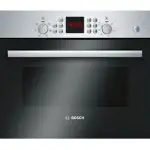
SHARP CORPORATION OF NEW ZEALAND
59 Hugo Johnston Drive, Penrose
Auckland, 1061
www.sharp.net.nz
